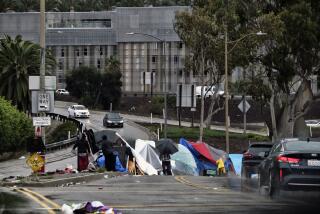The wrong way on transit
Los Angeles County voters soon may decide whether to raise $40 billion in local sales tax revenue for public transportation over the next 30 years. And like never before, the list of transportation projects to be funded -- a list largely dictated by Sacramento and a few local politicians -- will be firmly cemented in place.
With such large public policy consequences at stake, one would think that the projects would have received extensive public vetting and buy-in from residents and leaders throughout the region. After all, it will take a two-thirds vote to pass this measure.
But that is simply not what happened -- and it is why, tragically, there is no regional consensus on this half-cent sales tax proposal, which the Los Angeles County Board of Supervisors recently declined to put on the Nov. 4 ballot. The measure was created by a few, primarily to benefit a few communities, when all Los Angeles County residents will be asked to pony up a higher sales tax every time they make a purchase. The supervisors’ action on the tax was not a “public transit ego trip,” as an Aug. 6 Times editorial called it.
The Los Angeles County Metropolitan Transportation Authority was just beginning a process to consider what projects made the most sense to include in our next 30-year plan. We were just about to start public discussion on which projects produced the most bang for the buck; which ones best served the transit-dependent; which full list provided for the best geographic equity and other relevant criteria.
But that rational, fair and public approach was jettisoned. Instead, a few state and local politicians got together and pushed legislation that had Sacramento telling the MTA -- and Los Angeles County voters -- which projects they would have to build with the sales tax proceeds. They did not sit down with representatives of the 87 other cities in Los Angeles County -- or even most members of the MTA board. Proposed spending plans were kept under lock and key, and they were shared only hours before the MTA board was expected to rubber-stamp its plan.
The backroom deal was done, and it suited the deal-makers’ narrow needs just fine. When they brought their proposal to the last MTA board meeting for a vote, the deal-makers wanted no debate. They tried to silence dissent to their plan and voted against amendments seeking greater regional equity.
That’s unacceptable to me. What’s just as bad, though, is that Sacramento is dictating public transportation priorities for Los Angeles County residents. The half-cent sales tax proposal requires what’s called “enabling legislation” by the state; that is, we need the state’s approval to put the measure on our local ballot. But that doesn’t mean Sacramento has the right to tell us what to do with our locally generated tax dollars. I highly doubt the voters of San Diego County, San Francisco County or any other California county would be fine with such a blatant power grab -- nor should they be.
Neither am I.
And I’m not the only one who sees this usurpation of power for what it is. Members of the San Gabriel Valley Council of Governments are opposed to the half-cent sales tax measure as it is currently written. Even many lawmakers who represent the San Gabriel Valley in the Legislature and in Congress agree with us.
Raising taxes is a serious responsibility for each and every one of us, especially in today’s uncertain, economically weak times. Persuading voters to set aside their reservations and vote for the larger transportation good will be an uphill battle. Cogent, honest debate may help us build vital support. Backroom deals, usurpation of power and condescending name-calling will not.
As someone who supported Propositions A and C -- the two 1998 sales tax measures devoted to public transportation -- I deeply regret that I cannot support the current proposal. We all know our transit, bus and highway systems need improvement. So let’s go back to the drawing board and put together a measure that will build consensus, make pragmatic and reasonable arguments and allow for local review. These steps are not “parochialism,” as some claim. They are the building blocks of good government. They are the definition of effective democracy. They are the right way to get things done.
Supervisor Gloria Molina represents Los Angeles County’s 1st District.
Blowback is an online forum for full-length responses to our articles, editorials and Op-Eds. Click here to read more about Blowback, or submit your own by e-mailing us at opinionla@latimes.com.
More to Read
A cure for the common opinion
Get thought-provoking perspectives with our weekly newsletter.
You may occasionally receive promotional content from the Los Angeles Times.










